Posts Tagged ‘Displacement’ (110 found)
Forced Displacement Leaves Burmese Families Living in Substandard Conditions, with Higher Rates of Hunger and Sickness
The Burmese government violated international standards when forcibly displacing families from the Thilawa Special Economic Zone (SEZ) by threatening many residents with court appearances and imprisonment, giving them inadequate compensation for land lost, and failing to provide training or other means of income to those who lost their jobs, according to a new report by Physicians for Human Rights (PHR). […]
• • •Key Messages to World Leaders, International Governments and the UN Concerns and Requests Related to Humanitarian Situation in Kachin and Northern Shan States, Myanmar
The 25th ASEAN Summit is commencing from 11 to 13 November 2014, hosted by Myanmar in its capital, NaypyiTaw. Most prominent world leaders are gathering and discussing important matters affecting the ASEAN countries and, inevitably, the interconnected global arena. On this occasion, Joint Strategy Team for Kachin Humanitarian Response would like to urge the world leaders, international governments and the UN to pay attention to the following concerns and take immediate actions to fulfill the requests. We firmly believe that the world leaders, international governments and the UN will strongly support the protection of dignity and rights of the internally displaced persons. […]
• • •Protection and Security Concerns in South East Burma/ Myanmar
The peace process in Burma/Myanmar1 is at a critical juncture from which it could evolve into a transformative national dialogue or splinter into a divisive charade. While hopes for substantive and inclusive discussion about structural injustice remain, ongoing militarisation and attacks by the national armed forces2 are undermining the confidence of ethnic stakeholders. This report seeks to highlight the protection and security concerns of conflict-affected communities. […]
• • •Burma: USCIRF Issues Report on Religious Freedom and Related Human Rights Violations
WASHINGTON, DC – On the eve of President Obama’s November 12-14 trip to Burma, the U.S. Commission on International Religious Freedom (USCIRF) today released a new report, “Burma: Religious Freedom and Related Human Rights Violations are Hindering Broader Reforms.” The report and its recommendations reflect a USCIRF Commissioner-level visit to Burma in August 2014 by Commissioners M. Zuhdi Jasser and Eric P. Schwartz and two USCIRF staff. […]
• • •Voices from the Ground: Concerns over the Dawei Special Economic Zone and Related Projects
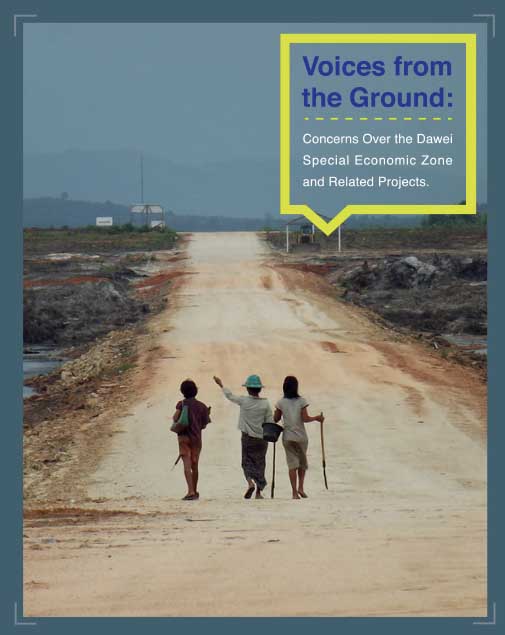 The report “Voices from the Ground: Concerns over the Dawei Special Economic Zone and Related Projects” calls on the National Human Rights Commissions of Thailand and Myanmar to collaborate and carry out a full investigation into all complaints of human rights abuses, relating to land confiscations and forced evictions as a consequence of the Dawei SEZ project activities or operations conducted by companies domiciled in Thailand or Myanmar.
The report “Voices from the Ground: Concerns over the Dawei Special Economic Zone and Related Projects” calls on the National Human Rights Commissions of Thailand and Myanmar to collaborate and carry out a full investigation into all complaints of human rights abuses, relating to land confiscations and forced evictions as a consequence of the Dawei SEZ project activities or operations conducted by companies domiciled in Thailand or Myanmar.
69th Session of the UN General Assembly – Situation of human rights in Myanmar: Report of the Special Rapporteur on the situation of human rights in Myanmar
I. The mandate of the Special Rapporteur on the situation of human rights in Myanmar was established pursuant to Commission on Human Rights resolution 1992/58 and recently extended by Human Rights Council resolution 25/26. The present report is submitted pursuant to Council resolution 25/26 and General Assembly resolution 68/242.
II. Background
2. Following the completion of the term of the previous mandate holder, the current mandate holder took up her functions only in June 2014, which resulted in a shorter period than usual to conduct a country visit and review the information gathered. The present report therefore sets out the Special Rapporteur’s preliminary observations, to be supplemented by her oral statement to the General Assembly […]
• • •New report by Network for Human Rights Documentation-Burma (ND-Burma) Documenting On-going Human Rights Abuses in Burma
ND-Burma has published its periodic report covering the first half of 2014, focusing on 103 documented cases of human rights violations in Burma from January to June, 2014. There are many serious human rights issues highlighted in this report: torture, extra-judicial killing, illegal arrests and detentions, arbitrary taxation, property crime, forced labor, human trafficking, forced displacement and rape […]
• • •What Refugees Say…
Between March‐April this year, focus group discussions were held with temporary returnees to SE Burma/ Myanmar from all 9 refugee camps along the Thailand‐Burma/ Myanmar border. The aim was to gain a snapshot of individual perspectives and concerns on current conditions on the ground, rather than conducting a formal survey representational of the whole refugee caseload.
The consultations focused on the conditions in the areas they returned to, the changes they and residents in those areas had detected since recent political and military shifts in the country, and their perceived current barriers to return.
The participants were identified by Section Leaders, with criteria that they must have returned to SE Burma/ Myanmar since the ceasefires were brokered, be adults, and that there should be some gender equity amongst them. In total, 85 temporary returnees participated in the consultations, with 35% being female. Over 100 others, comprising senior community leaders and CBO staff were also engaged through the process, although the main findings in this report only reflect the perspectives of those who had recently returned to their country of origin […]
• • •Flurry of Rumor and Counter Rumor Regarding Repatriation is Detrimental to Refugees
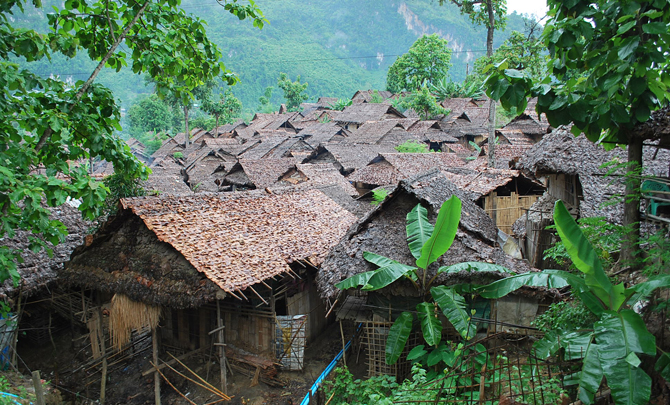 A week ago, rumors began doing the rounds that the Thai military plans to repatriate the 130,000 or so displaced persons from Burma living in nine camps in Thailand along the length of the Burma-Thailand border in the relatively immediate future. The rumors started when General Prayuth Chan-o-cha, Head of the National Council for Peace and Order (NCPO), mentioned that the refugee issue had been discussed with Senior General Min Aung Hlaing, Commander-in-Chief of the Burma Army. On 14 July, the Bangkok Post then quoted an unnamed Thai military source saying that working teams have sorted 130,000 refugees into three groups as part of preparations to send them home, a process expected to take around a year or more. A Burma Border Guard Force officer also told Mizzima on 15 July that armed ethnic groups in Karen State would allegedly cooperate in the resettlement of refugees on their return home.
A week ago, rumors began doing the rounds that the Thai military plans to repatriate the 130,000 or so displaced persons from Burma living in nine camps in Thailand along the length of the Burma-Thailand border in the relatively immediate future. The rumors started when General Prayuth Chan-o-cha, Head of the National Council for Peace and Order (NCPO), mentioned that the refugee issue had been discussed with Senior General Min Aung Hlaing, Commander-in-Chief of the Burma Army. On 14 July, the Bangkok Post then quoted an unnamed Thai military source saying that working teams have sorted 130,000 refugees into three groups as part of preparations to send them home, a process expected to take around a year or more. A Burma Border Guard Force officer also told Mizzima on 15 July that armed ethnic groups in Karen State would allegedly cooperate in the resettlement of refugees on their return home.
However, according to DVB, Colonel Weerachon Sukondhadpatipak, a spokesman for the Thai military, refuted the rumors: “I don’t think this [repatriation] will happen at this moment. It is an issue we need to solve, but it doesn’t mean we are sending the Burmese people back to [Burma],” Weerachon said. “It is a long process that needs to be discussed with all concerned parties.” Indeed, nationalities would first need to be verified and people head-counted […]
• • •Displaced Persons from Myanmar in Thailand
Recently there have been intensified interests and news circulation about the displaced persons from Myanmar in Thailand. Below are clarifications on this issue […]
• • •
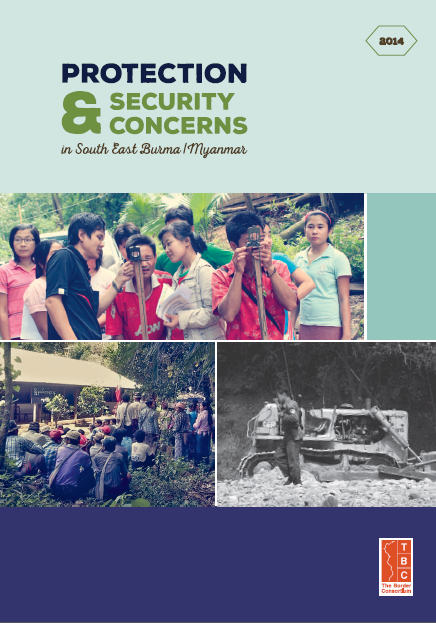
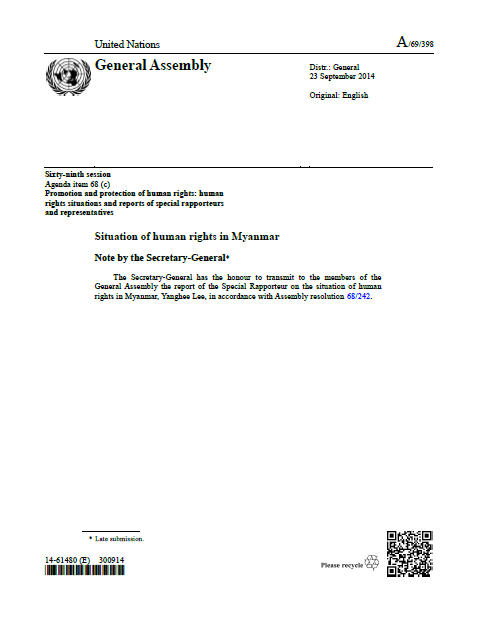
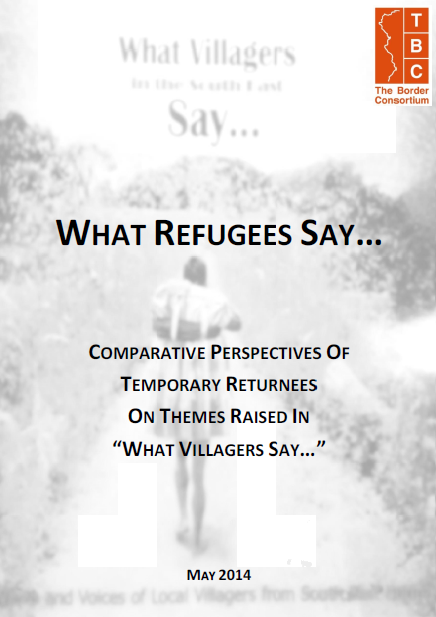








 All posts
All posts